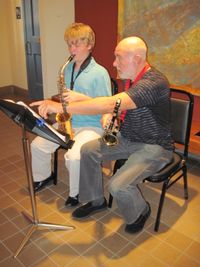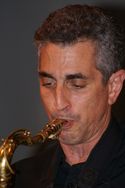Music Instruction
Professional Musician ♦ Recording Artist ♦ Music Educator
Berklee College of Music and Conservatory educational methods
Training for Novice, Intermediate and Adult Students
● Technical Studies ● Tone & Embouchure Exercises ● Daily Practice Routines
● Sight Reading ● Music Theory ● Playing Chord Changes
● Learning Compositions ● Improvisation Techniques
Music Styles
Jazz ● Classical ● Pop ● Rock ● Blues
Barron specializes in improvisation methods and techniques
Currently available for private flute lessons , group flute lessons, school clinics, master classes and workshops .
My experience, knowledge, teaching skill and understanding has given me the ability to communicate and inspire students to obtain whatever musical goals they wish to reach , learning to play music is a lifetime achievement. Arthur Barron

CONTACT ARTHUR BARRON AT 305-794-2845 FOR A NO OBLIGATION CONSULTATION
Credentials
Saxophone Instruction: Miami Dade College SCE, Kendall, FL
Jazz Improvisation Clinics: Miami Dade College, Kendall, FL
Saxophone & Flute Instruction: Music Workshop, North Miami, FL
Artist-In-Residence: Arts for Learning Jazz in the Americas Program, Miami, FL
Saxophone & Flute Instruction: Mars Music Learning Center, North Miami, FL
History of Jazz Course: University of Miami SCE, Coral Gables, FL
History of Jazz Course: Florida International University SCE, North Miami, FL
Jazz Improvisation Clinics: Berklee College of Music, Boston, MA
• Record of achievements as recording artist, bandleader, composer, arranger, producer and music instructor.
• Trained in music performance and music theory, and studied under world-renowned jazz musicians and educators.
• Professional music instructor, credentials include college level curriculum and private instruction.
• Artist-In-Residence for music workshop programs with Miami Dade County Public Schools.
• Received Honorarium from Miami Dade College for concert performances and clinics.
• Performed and recorded with internationally known jazz artists for over three decades, and
toured throughout United States, Europe and the Far East.
• Acclaimed CD recordings with major jazz record company and independent labels.
• Host of State of the Arts entertainment television program on Cable Tap TV (Miami).
• Radio commentator, interviewer and programmer on WDNA-FM (Miami), WMBM-AM (Miami Beach), KSAN-FM (San Francisco), KGKB-AM (Phoenix) and WERS-FM (Boston).
• Concert Director for CTI Records All Star Band and Personal Manager for CTI recording artists Deodato, Airto Moreira and Flora Purim.
• Concert promoter and booking agent for jazz and rock productions.
Bachelor of Liberal Studies: Barry University, Miami Shores, FL
Performance Program: Berklee College of Music, Boston, MA
Harmony and Composition Courses: Berklee College of Music, Boston, MA
Music Theory For Performing Musicians: Laney College, Oakland, CA
Theater Arts Program: Emerson College, Boston, MA
Law School: Suffolk University, Boston, MA
Saxophone & Flute: Joe Viola, Director of Berklee College of Music Woodwind Department
Saxophone & Flute: David Liebman, music educator and Grammy nominated jazz musician
Saxophone: Joe Henderson, Grammy award winning jazz musician
Arranging: Hilton Ruiz, Musical Director and Arranger for Tito Puente Jazz All Stars
Testimonials
When I moved from Argentina to Guatemala, I completely abandoned my tenor saxophone playing for over two years, which I still regret doing. But, when I relocated to Miami, I decided to resume studying and practicing, and was very fortunate to Arthur Barron through his website.
Arthur’s way of teaching instantly reignite my passion for the instrument, which has now become part of my life again and my playing is continuously improving. Lessons with Arthur has become an important part of my life, and I feel that I am continuously progressing.
Arthur has the ability and flexibility to guide you through the basics like embouchure exercises, tone and sound quality and sight reading, to more advanced study on music theory and jazz improvisation. His constant feedback encourages you to keep going and improving. Arthur is relatively strict and very straightforward in his feedback, so you will certainly know when you are doing well, and when you have lost focus and are screwing up. And, that makes the difference: constant, direct and constructive feedback. Arthur is a natural coach and mentor.
With his method and personalized help you will start improving and recognizing the difference in your sound. The more discipline and practice you put in, the more advanced you will become to where you find yourself playing jazz standards as well as classical etudes, which you did not remotely think that you were capable of playing before studying with Arthur.
As an extra perk, you will also get to enjoy the great discussions about music, trips and books. Studying with Arthur Barron is a genuine experience! Martias Bravo

Along with his teaching ability, Mr. Barron has an amazing amount of wisdom and insight that comes from all his experience in the music business. He has conveyed to me the importance of character and the persistence that it takes to become a successful musician. Studying with him has not only improved my playing a great deal, but has also giving me a greater sense of direction and improved my perspective on music and life as a whole. Keenyn Moore


Arthur has patiently helped me to become a proficient sight reader. He emphasized reading notation in the ledger lines both above and below the staff, and pushing me to become more comfortable with the full range of my instrument, especially in the upper register. His lessons on theory, especially his teaching of the modes, allowed me to attain improvisation skills that I never thought I would have. Lots of time is given to chord and scale theory, having this knowledge makes encountering a complicated altered chord or difficult scale much less daunting.
Another skill learned with Arthur is being able to count time, which for me, is probably the most challenging aspect of my playing. With all the dotted, slurred and syncopated notes encountered in jazz, his perseverance in getting the timing right is essential for the performing musician. Between his emphasis on keeping good time and not allowing the student to ignore the dynamics of the tune, some really nice music can be produced.
Arthur has also taught me how to analyze a composition. By revealing the structure of a tune, the composer's musical ideas are more readily understood which makes playing of the melody easier and the solos more understandable, for both performer and audience. My thanks to Arthur for all the time and effort put into teaching me how to play the alto saxophone! Ken Kay

When I first started taking alto saxophone lessons with Arthur Barron, I barely knew how to hold the saxophone let alone play anything resembling coherent sound. Nevertheless, in the short amount of time that I have been studying with Arthur I have learned how to play a variety of major, pentatonic, and blues scales and have begun to learn how to improvise. I meet with Arthur about once a week and the time is not wasted. Every week it seems we simultaneously work on my timing, technique, sound, improvisation skills, and understanding of music theory. Every week I learn something new and can easily see the progress I am making under Arthur's guidance. Arthur has a great sense for when and how to challenge his students. He also seems to get you to play and advance to the best of your ability without overwhelming you or holding your hand. Another thing about Arthur is that he is genuinely eager to learn your interests and adapts his teaching to fit those interests and help you meet your goals. For example, I indicated I had an interest in blues and since then he has tailored several of our lessons to helping me learn the fundamentals necessary to understand and play the blues. Which leads me to my next point, Arthur possesses a tremendous amount of knowledge and experience as someone who has played and studied music all over the world. Our lessons are enriched by the fact that I am learning from someone who has so much experience and truly loves the craft. Above all else Arthur is a great teacher. If you are serious about learning the saxophone then you could not find a better teacher. Matthew Hernandez

I take jazz tenor sax lessons weekly with Arthur Barron. In most of our lessons, we start by working on technique, then we learn/play a tune and then we try improvising on the tune. Throughout the lesson, Arthur plays his sax alongside me. During technique development and playing tunes as written, I can hear Arthur's tone, articulation and phrasing and I can feel the way he keeps the time and plays jazz 8th and 16th notes. When we take turns improvising on tunes, I listen to Arthur's solos which give me ideas that I can try to incorporate into my playing.
The technique development portion of our lessons has varied greatly over the years. In the beginning I learned to play all 12 major, minor and dominant seventh scales and chords. Then I learned to play each scale starting on any note rather than just on the root. This helps with improvising over chord changes and led to an understanding of modes; the dorian minor was just the major scale starting on the second, the dominant/myxolidian was just the major scale starting on the fifth, the locrian was just the major scale starting on the seventh, etc. Now we are working on the II-V-I progression in all 12 keys and Arthur is teaching me to improvise on this progression at ever increasing tempos. Improvisation has been difficult for me, so Arthur suggested I write down licks that I like, learn to play them in time in one key and then learn to transpose them to all 12 keys. We are also working on melodic connections so there is a smooth flow to improvising over the chord changes. Learning about leading tones and looking ahead to see the next chord change while I am still playing the previous change are things I understand cognitively but I am having difficulty putting them into practice. Lately, we have started to do more sight reading and we are going back to the Rubank books to work on 16th notes and on different rhythms and phrasings.
When it comes to playing tunes, we start by looking at the key the tune is written in, then we look at the chord changes to see how they relate to each other and how they relate to the tonic, then we look at the whole notes as the parts of the melody that receive extra emphasis. Once we understand the basic structure and harmony of the tune, we play the head. Before we improvise on the tune, we analyze and then play the scales and chords involved. Often there are altered chords which I don't understand and we spend some time clearing those up. I learned the diminished scales this way and I became acquainted this way with #9, #11 and #13 chords and b9 and augmented chords. The more I learn the more I realize how much I don't know. Once we have reviewed all the scales and chords and have played them to get them under my fingers, we play the head a few more times and then we improvise. Keeping the time while playing the head and during improvisation solos are difficult for me which has led to many hours of practice with the metronome.
On a few occasions, Arthur has arranged for me and one of his other students to play with his band in concert live and to solo on a few of the tunes. This was frightening because I don't feel competent enough with my instrument to perform live for an audience. Nonetheless it was a good experience because it showed me what skills I need to develop to be able to perform live. Saul Gross


